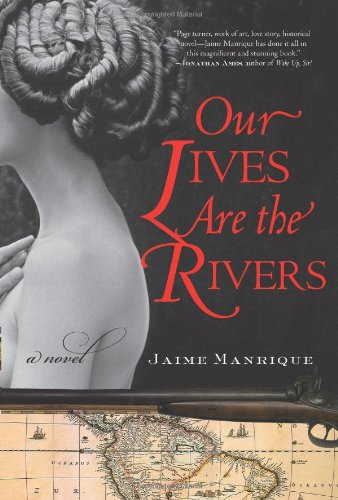Our Lives Are the Rivers
History recognizes Manuela Sáenz, mistress of the 19th century revolutionary Simón Bolívar, as one of South America’s earliest feminists and greatest patriots. She earned her nickname “La Libertadora del Libertador” – the liberator of the liberator – for helping her lover escape an assassination attempt in 1828. In his bold and lyrical fourth novel, Manrique vividly portrays the passionate woman whose love affairs with one man and his vision were inseparable in the end.
“I was born a rich bastard and died a poor one,” Manuela tells us, beginning her fictional memoir of sorts with her childhood schooling at a Quito convent. The nuns’ cruel treatment of her, the illegitimate daughter of a wealthy criolla by a Spanish nobleman, turns her against Catholicism for life. In her eyes, the Spanish remain a symbol of repression and slavery, and she grows up intensely admiring Bolívar and his ideals. Although her father recognizes her at last as his daughter, he forces her to marry a wealthy Englishman; this cements her negative opinion of his countrymen. Manuela’s all-too-brief relationship with the legendary Bolívar, the great love of her life, is the culmination of her dream to unite with the revolutionary cause.
In alternating between the viewpoints of Manuela and her African slaves, Jonotás and Natán, Manrique gives us further insight into Manuela’s character. His prose is direct yet evocative, full of the vibrant color of colonial South America – its flowering plants, its wild fauna, its horrible, bloody violence. Romantic and tragic in equal measure, Our Lives Are the Rivers is well worth reading by anyone familiar with South American history, but especially by those who aren’t.










